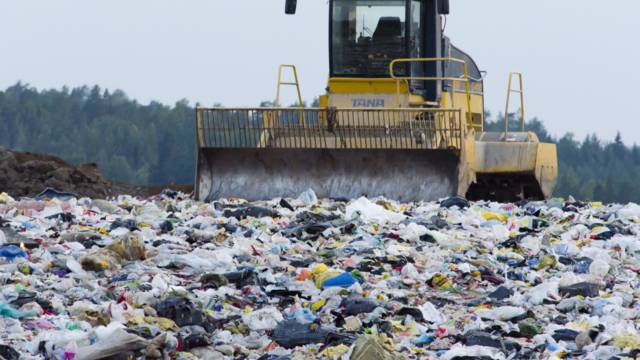
By Amy Goodman & Denis Moynihan
In Geneva, Switzerland’s Place des Nations, the plaza outside the United Nations campus, a replica of Auguste Rodin’s famous sculpture, The Thinker, has been installed. Like the original, the seated figure holds his chin in hand, but the hand in this version also clutches several empty plastic bottles. A baby lays across his other arm, resting its head in the Thinker’s left hand. The Thinker gazes down, past the baby, onto a sea of plastic waste that surrounds the statue. The statue’s placement coincides with a ten-day summit inside the UN, where negotiators hope to finalize the Global Plastics Treaty, an ambitious effort to reverse the overwhelming amount of plastic waste polluting the environment and negatively impacting human health in countless ways. Canadian artist Benjamin Von Wong calls his piece “The Thinker’s Burden.”
“Over the course of the next 10 days, we’re going to be slowly adding more and more plastic to this art installation to show the growing cost being passed on to future generations if we don’t take urgent and immediate action,” Von Wong told Agence France Press as he added plastic to the pile. “If you want to protect health, then we need to think about the toxic chemicals that are entering our environment. We need to think about limits on plastic production. We need to think about a strong, ambitious plastics treaty.”
The Global Plastics Treaty was supposed to be finalized last year at a summit in Busan, South Korea. Negotiations broke down between two major blocs of nations, those seeking controls on plastics and harmful chemicals, and nations with economies largely reliant on fossil fuel production, like Saudi Arabia, Iran and Russia. Since then, of course, US President Donald Trump began his second term, with his MAGA mantra of “Drill, Baby, Drill.” His appointees, like Energy Secretary Chris Wright, a former fracking company CEO, are shutting down climate programs, attacking climate science and promoting climate deniers to key policy positions.
It is in this context that The Lancet, the premier British medical journal, has launched the Lancet Countdown on health and plastics, “a health-focused, indicator-based, global monitoring system on plastics,” with a global team of scientists led by Dr. Philip Landrigan, director of the Boston College’s Global Observatory on Planetary Health.
“The global plastic threat has been quietly worsening; global plastic production has increased 250 times since it began in the 1950s and as it’s on track to double by 2040, and triple by 2060,” Landrigan said on the Democracy Now! news hour.
“The reason plastic production is growing so rapidly, especially production of single use plastics, is the fossil fuel industry. Ninety-nine percent of plastic is made from oil, gas and coal. They see the market for fossil fuels declining…they see the long term trend for the fossil fuel market going down, so they’re putting enormous resources into plastic.”
Dr. Landrigan continued,
“Plastic harms human health at every stage of the plastic life cycle, starting with the fracking and through the manufacturer and the fabrication of plastic products, and finally, when plastic is discharged into the environment. Waste plastic contains 1000s of toxic chemicals that cause human exposure that result in disease, disability and premature death.”
The Lancet group released a comprehensive report with their announcement, detailing the scale of the problem. Plastic pollution has been found from the deepest ocean depths to the slopes of Mount Everest. Plastic nanoparticles infiltrate the human body, from the brain to breast milk. The impacts on children are the most severe, Landrigan said:
“Infants in the womb and young children are very vulnerable to plastics…chemicals get out of plastics, get into pregnant women and then pass through to their children, and in children they can cause a whole range of diseases that encompass brain injury, resulting in decreased IQ, injury to the reproductive organs, resulting in decreased fertility when today’s child becomes tomorrow’s adult, and damage to the liver, which interferes with cholesterol metabolism and increases risk for obesity, for diabetes, for heart disease and stroke.”
Auguste Rodin sculpted The Thinker between 1880-1881, less than 20 years after plastic was invented in England. Rodin intended the sculpture to be part of a larger, epic piece called “The Gates of Hell,” inspired by Dante’s Inferno. “The Gates of Hell” consumed much of Rodin’s life, and was only cast after his death. His pensive Thinker, meanwhile, went on to achieve global renown on its own.
We are now at a moment where life truly is imitating art; the fossil fuel industry is driving us into an inferno, accelerating the climate catastrophe and blocking meaningful action on climate and on the Global Plastics Treaty. We are standing at a real-world version of Rodin’s Gates of Hell, where thinking about the problem is no longer enough.











Media Options